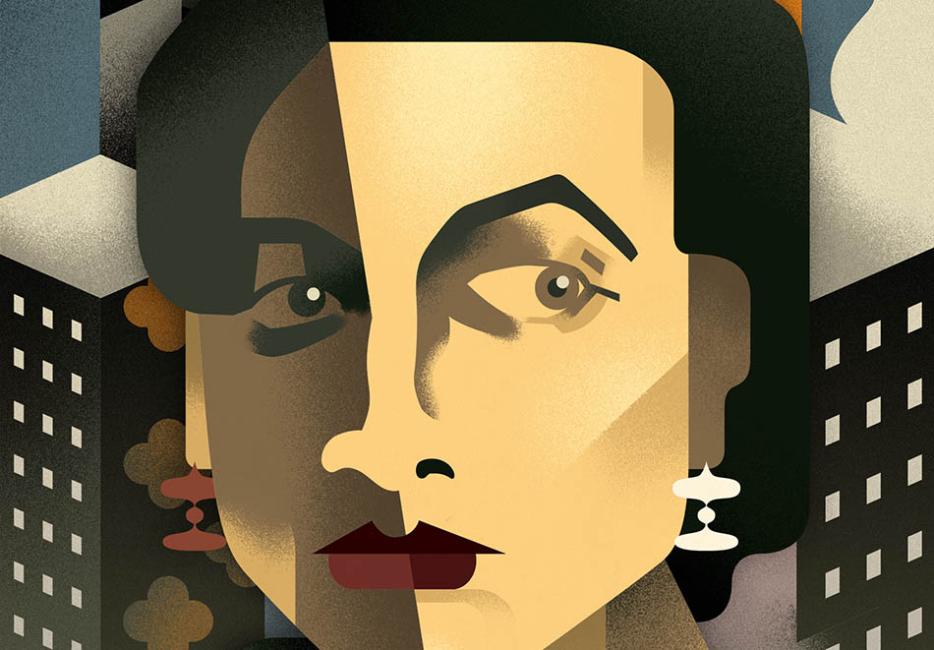“At four Bela was developing a memory. The word yesterday entered her vocabulary, though its meaning was elastic, synonymous for whatever was no longer the case. The past collapsed, in no particular order, contained by a single word.”
–The Lowland, by Jhumpa Lahiri
Visiting from Montreal two months ago, my father sat across from me in my Brooklyn apartment quizzing me on the names of Indian spices as he funneled them from sticky plastic packets into labeled jars. Kala jeera! Panch phoron? Cardamom, duh! I guessed some and confidently yelped the Bengali names of others, and when I was stumped, I tried to change the subject by suggesting I boil water for tea. The spices had been piled in my pantry for three years; a gift from my mother and stepfather who, hoping I might show an interest in cooking, had thoughtfully assembled a starter pack, so to speak. I have since used the cumin, some bay leaves, the turmeric, and mustard seeds—though I am tentative of the latter as they pop in hot oil and my stove sits at a precarious slant.
It was July and muggy, and we had turned off the fan to avoid dusting my dining area with spices. Seeing as he was only in New York for a short visit, I worried this was an awfully unspectacular way for my father to spend his vacation. And yet, the more I proposed alternatives—“The MOMA, Baba? A walk and some ice cream, Baba?”—the more he smiled and shook his head as if affectionately saying, nice try. Consolidating cardamom for his 27-year-old daughter, it turns out, was the only thing my father felt compelled to do.
While admittedly the image of my father and I organizing spices invokes the clichéd trappings of Indian diaspora fiction, I am unexpectedly quieted by the memory of that afternoon. A week or so later, The Lowland, the latest novel by Jhumpa Lahiri (author of the Pulitzer Prize-winning Interpreter of Maladies and The Namesake) arrived at my door. Aware that it was partially set against the violence of the Naxalite student movement in Calcutta in the 1960s and ’70s, which rippled from a peasant uprising in the small West Bengal village of Naxalbari, I felt an acute and long-abiding familiarity with the novel’s premise.
My father was as a gangly 18-year-old engineering student at Calcutta’s Jadavpur University when he became deeply involved with the radical communist Maoist movement. A year later, in 1969, he was forced underground—most of his Naxalite friends were killed, jailed, or tortured in jail and killed. In December of 1973, he left Calcutta to complete his engineering degree at Washington University in St. Louis, finally finding his way to Montreal with a suitcase packed with LPs and not much else.
Since childhood I have shared a tacit camaraderie with my father, fathoming his past at a vague, heedful distance. Later, as a teenager, I began to understand more carefully the Naxalite history and my father’s revolutionary roots as we chatted from the car to the grocery store and then back to the car while he ran weekend errands. I dissociated my father’s tumultuous years at Jadavpur from his thumbing open a plastic produce bag or collecting bok choy from the local co-op. Since reading The Lowland though, my perception has shifted and my father’s past is less formless. He lived more years before becoming a parent than he has since, and those earlier years are the ones that have preoccupied me in recent months.
Shortlisted for the Man Booker Prize, The Lowland tells the ambitious 50-year story of one family bound by tragedy. It begins with brothers, Subhash and Udayan, who were born 15 months apart but whose lives fork irrevocably when Subhash pursues a Ph.D. program in Rhode Island and Udayan, after immersing himself in the Naxalite movement’s violent actions against the state, is brutally shot and killed by the police. As Lahiri writes, in her plain yet truly perceptive way, Subhash was from this point forward an only son, “an experience that had left no impression in the first fifteen months of his life. That was to begin in earnest now.”
Udayan is also survived by his young wife, Gauri, who—while he never learned of it—is pregnant with their daughter. Subhash, charged with a sense of fraternal obligation to his brother and awake to the struggles she will face alone in Calcutta, marries Gauri and brings her to the United States. Soon Bela is born, and while her parents have arranged themselves as a family, they live instead as a repercussion. Though Subhash cares for Bela as if he were her biological father, Bela’s inevitable discovery of Udayan looms perilously for the majority of the novel.
Meanwhile, Gauri is maternally detached—“the love she’d once felt for Udayan refused to reconstitute itself”—and in seeking her own academic pursuits, makes a potentially unforgivable decision later in the book. Her story is The Lowland’s most poignant because from the moment we meet her, Gauri is occupied by Udayan. Once he is gone she tries desperately to reclaim herself. Theirs was Gauri’s first love—the one that is meant to meander (and maybe break) but more so, move past that feverish sense of emotionally tenancy. “He was flirting with her. She felt him forming an opinion even as he stood there looking at her and talking to her. An aspect of her, in his mind, that he already possessed. He’d plucked it from her without her permission.”
Grief is portrayed generationally, and is not only a result of someone lost but also something lost: a movement, a first love, a father who would never meet his granddaughter, a mother’s now rheumy, detached stare. Long before all of that, two brothers were still boys pocketing golf balls at the Tolly Club, lacing their fingers together and lifting each other up over walls.
The Lowland, revisiting those themes of first-generation Indian immigrant life typically associated with Lahiri’s writing, shifts between Calcutta’s insurrection and the winding estuaries and quiet seaside beaches of Rhode Island, occasionally manufacturing local as metaphor: “On cloudy days, at intervals, the sound of a foghorn pierced the air, as conch shells were blown in Calcutta, to ward away evil.” But the novel’s most powerful juxtaposition is made between time periods as well as points of view. Jumping back and forth, the narrative seamlessly reconciles various family members’ speckled remembrances and in this way, The Lowland does not belong to a single character. “I just wanted to write a novel where there were no heroes necessarily,” Lahiri recently told me over the phone. “And in which no one is entirely innocent.”
Occasionally my father will mention that he misses his parents. He’ll say it in passing and sometimes out of context, as if it were a thought he had perhaps not meant to say aloud. Though my brother and I never met our grandfather, my father has recounted (and repeated) stories about him to us, occasionally pausing to say, He would have really enjoyed you. (I am hard pressed to find a more accurate description of a grandparent’s love than the pleasure of a grandchild’s very being.) In a sense, I am safeguarding the memories of my father’s memories, or at least, a fictional account of them. They exist in that part of my recall which looks like a room washed in afternoon sunlight, brightening and darkening, and turning warm again as clouds pass.
Stories from my father’s Naxalite years have been stored in a similarly illusory manner. And in talking with Lahiri, I learned that the history in The Lowland—inspired by a story that was told to her involving two brothers killed during a paramilitary raid in Tollygunge—is culled from a “blurry,” dreamlike place in her memory. “I had grown up hearing stories about North Calcutta where my mother is from, stories about what was happening there, on the streets, the curfews and the shootouts. And it was all so foreign from my own upbringing. I didn’t know how to approach it because I had had such an incredibly sheltered upbringing in comparison. Having absorbed this history as a young child living in the United States there was a complete sense of unreality of it.”
That sense of disconnect is an essential trait of being first generation. The “unreality” of one’s earliest memories of a parent’s memory accumulate like filmy residue. I am a culmination not just of my parents, but also of the space that removes me from their pasts. It is braided into my DNA, though I couldn’t say exactly what it is. As Lahiri said of Bela, “She is who she is. She’s struggling intensely with her identity but she doesn’t even realize it.”
Proof is The Lowland’s ballast. “Part of the history of what happened in those years in Calcutta was an attempt to leave no proof,” Lahiri explained to me. “People were executed in cold blood. People were arrested beyond the law.” The Lowland’s most striking imagery characterizes this idea. After Udayan dies, Gauri closes the door and shutters of their bedroom as if to safeguard any “invisible particles of him.” Despite Bela’s peripatetic life working on farms across the Unite States, physically she retains parts of her mother, like the “freckled constellation of [Gauri’s] darker pigment, an almost solid patch at once contained and conspicuous.” At the very start, Udayan’s rascally childhood as the more boisterous of the two brothers is illustrated with an image of his footprints trailing down the family’s cemented pathway—proof of his father’s refusal (and incapacity) to pave over, to forget. “I think that when anything really traumatic happens in a family, it’s very hard for anyone member to really move on,” Lahiri shared. “It alters the family fundamentally. They’re all of a piece.”
Over the last half decade my father has returned to Kolkata more regularly, sometimes visiting twice or three times in a year. With each stay he extends the length of his trip, renovating or further furnishing our apartment in Ballygunge Place. He reupholstered a loveseat with a ruddy orange striped fabric and the side tables have been re-stained a burnished mahogany. These are all, I have learned, pieces my father saved from his childhood home, that are recognizable to him in the way the curved back of a chair can, in a flash, conjure a parent’s reading posture.
But there is also, among the testaments to another time, the incongruent new. A year ago my father mounted a flatscreen TV onto the living room wall so he could watch cricket matches and in January, when we all vacationed together in Kerala then Kolkata, I noticed little tokens of Montreal—as simple as dishtowels or a brand of shampoo—that he’d brought and left there. I drank tea every morning from a mug with a faded Sears portrait of my brother and I printed on one side. We’re wearing matching T-shirts and haircuts, and emphatic, near goofy smiles.
Growing up in Montreal, our home was decorated with handloom cushion covers and block-printed tablecloths. In the linen closet, my mother stored extra bars of Sandalwood soap, the smell overpowering our towels and pillowcases. Now in Kolkata, the inverse was true. It felt as though my father was steadily moving towards his past, one travelled trinket at a time.
While I am careful to separate my interest in Lahiri’s work from a self-involved enthusiasm about a Bengali woman writer who is also first generation and was raised on the East Coast, I cannot deny the delight (and innocence) of recognition—often brought on by a word or turn of phrase as basic as “Baba,” that I had only ever heard at home but now find printed in the The New Yorker on my lap as I ride the subway. These are the naïve moments I allow myself because I have never once called my father “Dad.”
But once I started reading The Lowland, recognition turned to pang and I no longer felt like an innocent reader. I have since realized how guiltlessly you can love a book when the emotional connection is strictly yours. What if the story is nearest to your parent’s past? To that inaccessible nook of pain they’ve carried with them through parenthood? Never before have I felt so plainly the inheritance of trauma.
The day my father flew back to Montreal after his New York trip, I emailed my friend the sort of thought I have an hour so after I’ve said goodbye to someone I love, knowing well that he or she is still in the same city as me, likely only just past security at the airport. I wrote: I wonder when my parents became parents first and everything else second. In the month that followed I would immerse myself in a novel set during a misplaced time I had only ever heard about at home, that was now on my lap as I rode the subway, as I reached into my bag to pull out my pen and underline sentences like, It was the sort of spontaneous association one might make while looking up at a passing cloud, as though nudging myself to text my father later, simply to say, Hi!
This article originally appeared in Hazlitt No. 1
Illustration by Dave Murray






